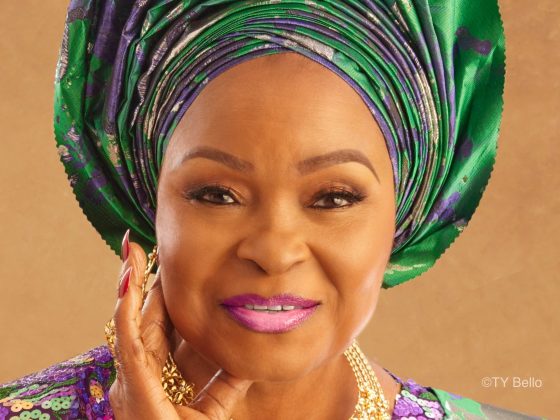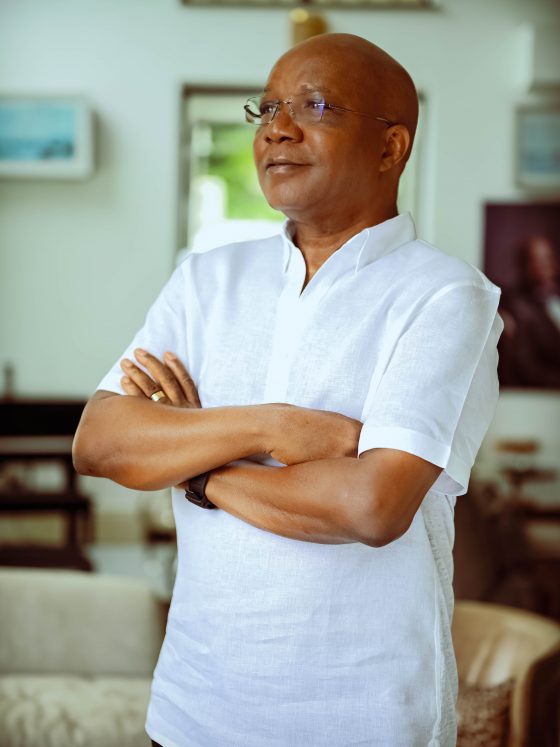Meet Osayi Alile, a remarkable advocate of social enterprise and the CEO of Act Foundation, a grant-making non-profit organisation that provides funds to the social sector to create change in the society we live in today.
Armed with an impressive academic background, extensive experience in the banking industry, and expertise in Human Development, she is fast becoming that catalyst for social change and has, over time, worked tirelessly, engaging with stakeholders to make a transformational social impact in the areas of education, health, entrepreneurship, the environment, and leadership.
Her hard work, dedication, and resilience in the social sector are second to none, and through it, her foundation was adjudged “Not-for-Profit of the Year” three years in a row at the 2018, 2019, and 2020 SERAS CSR Awards. Recently, Osayi turned the Big 50 and had a sitdown with Funke Babs Kufeji, where she spoke about the importance of creating a positive social impact in our world, women, youth empowerment, equity, and so much more.

Going straight in, can we talk about the Aspire Coronation Trust Foundation (ACT) and your current role there as the CEO?
Over the last five years, the Aspire Coronation Trust (ACT) Foundation has supported 80 non-profit organisations across 8 African countries to address important social challenges and related vulnerabilities across Africa. From providing prostate, breast, and cervical cancer screening to over 22,000 people, supporting over 2,000 girls in secondary schools with STEM training, planting 3,028 trees, and engaging 1.5 million Nigerians on national development and good governance, the foundation, through its grantees, has touched the lives of over 2 million people. ACT Foundation is a grant-making organisation supporting local, national, and regional non-profit and social enterprise organisations providing high-impact solutions in the areas of Health, Entrepreneurship, Environment, and Leadership on the continent.
As the CEO of ACT Foundation, I lead a vibrant team of social impact practitioners engaging with non-profits and social enterprises across the continent. My role is to provide strategic direction to the team, and you can also say I am the ‘chief marketing and branding officer’ for the organisation.
Now, generally speaking, what is the social sector’s role in shaping the community for the future in Nigeria and Africa?
Social sector organisations work closely with grassroots communities affected by the various social issues plaguing Nigeria and Africa. From challenges with access to basic services like healthcare and education to insecurity and conflict issues to gender-based violence, social sector organisations have firsthand knowledge of the issues and are responsible for designing sustainable solutions to address them. The social sector is also responsible for connecting donors or philanthropic institutions to the communities they seek to support by implementing programs and providing innovative solutions.
Going by your experience, what would you say are the common social issues faced on the African continent?
There are numerous challenges faced across the continent, with many similarities. The challenge of insecurity across some select states in the country has exacerbated the already existing issues around poverty, healthcare, education, employment, etc. The COVID-19 pandemic also further revealed vulnerabilities in our public health and social welfare sectors. There are also challenges that are based on gender discrimination and inequality, including gender-based violence, the absence of economic empowerment for women, low education rates for girls, etc.
When it comes to Nigeria, what are some of the prevailing social issues, and how are they being addressed?
As Africa’s most populous nation with minimal amenities and infrastructure, Nigeria’s over 200 million population faces a myriad of challenges ranging from health to unemployment, insecurity, poverty, poor leadership, and youth restiveness, among others.
As an organisation, we are committed to addressing and providing innovative solutions to social, economic, and environmental challenges and associated vulnerabilities across the African continent. Some of these challenges include malaria, cancer, eye care, pollution, recycling, tree planting, and youth leadership. Through our innovative programs and grant-giving, we have empowered many individuals across the 36 states of the country.

In your view, what is the role of the government and the private sector regarding social issues in Nigeria?
Currently, there is a greater emphasis on collaboration and partnership, both within and across sectors. Actors from the social, private, and public sectors are working together more than ever to address recurring social challenges collaboratively. The Coalition Against COVID-19 (CACOVID), of which I served as co-administrator, is a great example. While it was driven by the private sector, especially regarding financial support, it was technically supported by the public sector and operationalized by the social sector. Also, in the last five years, we have worked in partnership with Access Bank to fund many impact projects reaching over 2 million beneficiaries across 8 African countries, including Nigeria. These kinds of partnerships can only positively influence the growth of the sector in the years to come.
Do you feel these two institutions are doing enough in the social sector, and if not, what more can be done or should they be doing?
As I mentioned above, there have been a lot more collaborations from the government and the private sector in recent years. However, there is room for much more collaborative relationships. In the global space, there is a call for more indigenous philanthropy and less dependence on international partnerships because we are best poised to solve our problems. This approach calls for more deep-seated collaborations between the public, private, and social sectors.
The social issues faced in Nigeria are a lot, and many non-profit organisations have been doing a lot of work to help, but so much more needs to be done. What should the non-profit sector adopt going forward to improve its impact?
The non-profit sector has resourceful professionals doing phenomenal work to address the vulnerabilities and challenges in the space. However, a lot of times, they work in silos or as though in competition with one another. To consolidate efforts, the non-profit sector players need to find common grounds for collaboration and partnership that will bring about even greater results. This needs to be well thought out, and the players must play to each other’s strengths for meaningful impact. Working together will help leverage resources, expertise, and networks to address social issues more effectively. Secondly, non-profit organisations should prioritise data collection and analysis. By gathering accurate and comprehensive data on social issues, they can better understand the root causes and develop evidence-based solutions. This can lead to more targeted interventions and better outcomes. We have conducted several studies in the past that have contributed to the body of knowledge in the non-profit space. Recently, we conducted research to promote a comprehensive understanding of gender mainstreaming and offer best-practice guidance on integrating gender as a cross-cutting issue within NGO programmes. We expect that this will increase the uptake of gender-transformative programming in the non-profit space.
Lastly, we must embrace a culture of innovation and adaptability and leverage technology by using digital platforms and tools to streamline our operations and reach a wider audience.
How do you source funds as a non-profit organisation, knowing the prevailing corruption issues in Nigeria and the mistrust people have regarding giving to charity?
At ACT Foundation, Integrity and Accountability are at the top of our list of core values. We highly regard our funders and partners and demonstrate credibility in our fund management. We prioritise transparency in our financial operations, providing regular updates on how funds are utilised. This helps us build trust and alleviate concerns about corruption. We also collaborate with reputable local and international organisations to enhance our credibility. For example, we were recently funded by the Charities Aid Foundation, America, and we had to go through a series of verification processes to get the funding. I am convinced that we were successful because of our credibility.
In your years working in this sector, will you say Nigerians are philanthropic?
I strongly believe that Nigerians have philanthropic tendencies and have a long-standing tradition of giving and supporting charitable causes. We often engage in informal giving practices, such as providing financial assistance to family members, friends, and community members in need. Additionally, there are numerous philanthropic organisations and foundations in Nigeria that work towards addressing social issues and improving the well-being of communities. I come from a family of generous givers, and most people in my network give to different causes. However, it is important to note that there are always opportunities for further growth and engagement in philanthropic activities to harness the philanthropic potential of Nigerians and further enhance their impact in addressing social challenges. To achieve this, we must give strategically, document our giving and its impact, and tell our stories in ways no one else but us can.
You recently turned 50, and the accolades and well wishes you got were very heartwarming, with most people praising your commitment and dedication to helping and empowering. Tell us how you got into social work. Was it something you wanted to do growing up?
Growing up, I always wanted to become a lawyer because I believed I was a great arbitrator and could win any case. I used this skill in conflict resolution among my siblings, and everyone thought I would become a lawyer. However, after university, my career started in the banking sector. In the course of this, I volunteered in a non-profit project just as I was about to begin my master’s program, and that was when I developed both an interest and a passion for the social sector, and I changed my Master’s program to a non-profit course. The rest, they say, is history. Over the years, I have continued pursuing this passion and am determined to leave behind my footprints in the sector.
So far, what has been your greatest achievement in the social impact sector?
My greatest achievement lies in the impact of our work over the years on the improved living of people within Nigeria and in Africa. As I look back on my years in the social sector, I am very proud of the level of impact the sector has had on individuals, systems, and structures. Also, I am very proud of the overall growth of the social impact sector in Nigeria. Bringing it home, I am proud of the over 2 million individuals Aspire Coronation Trust Foundation has impacted in the last five years through our programs and projects on health, environment, entrepreneurship, and leadership. I am proud of the over 80 organisations we have funded in Nigeria and Africa and the impact of these projects on the lives of millions across the continent. All of these are my greatest achievements.
Let’s talk about the importance of technology for social issues. What role does technology play in addressing social issues and helping to solve them?
The social sector’s future and its impact largely depend on how much we leverage technology. Among the various benefits of technology in this sector is its impact on widening the reach and impact of social projects. Exploring the use of technology tools like social media, digital messaging, the internet, and artificial Intelligence, among others, has proven to boost social interventions and their impact.
In the coming days, technology will play a major role not only programmatically (in how funders and implementing organisations engage) but also operationally (in how individual organisations operate internally). There is a need for social enterprises to adjust and embrace tech innovations as their future.

Having played in this sector for this long, what lessons have you learned while trying to tackle some of these prevalent social issues in Nigeria?
Social impact work is never done. But I will say that I am proud of the support we’ve been able to give to social sector organisations doing great work to address the numerous challenges we’re faced with as a continent. So far, we’ve impacted over 2.2 million beneficiaries in about six years, and we hope to grow that number exponentially. I’m also proud of our work with our Changemakers Innovation Challenge (CIC) – supporting non-profits and social enterprises leveraging technology and digital tools to create social change.
What is your advice to those trying to enter this sector?
Be passionate, be innovative, stay focused and grow.













